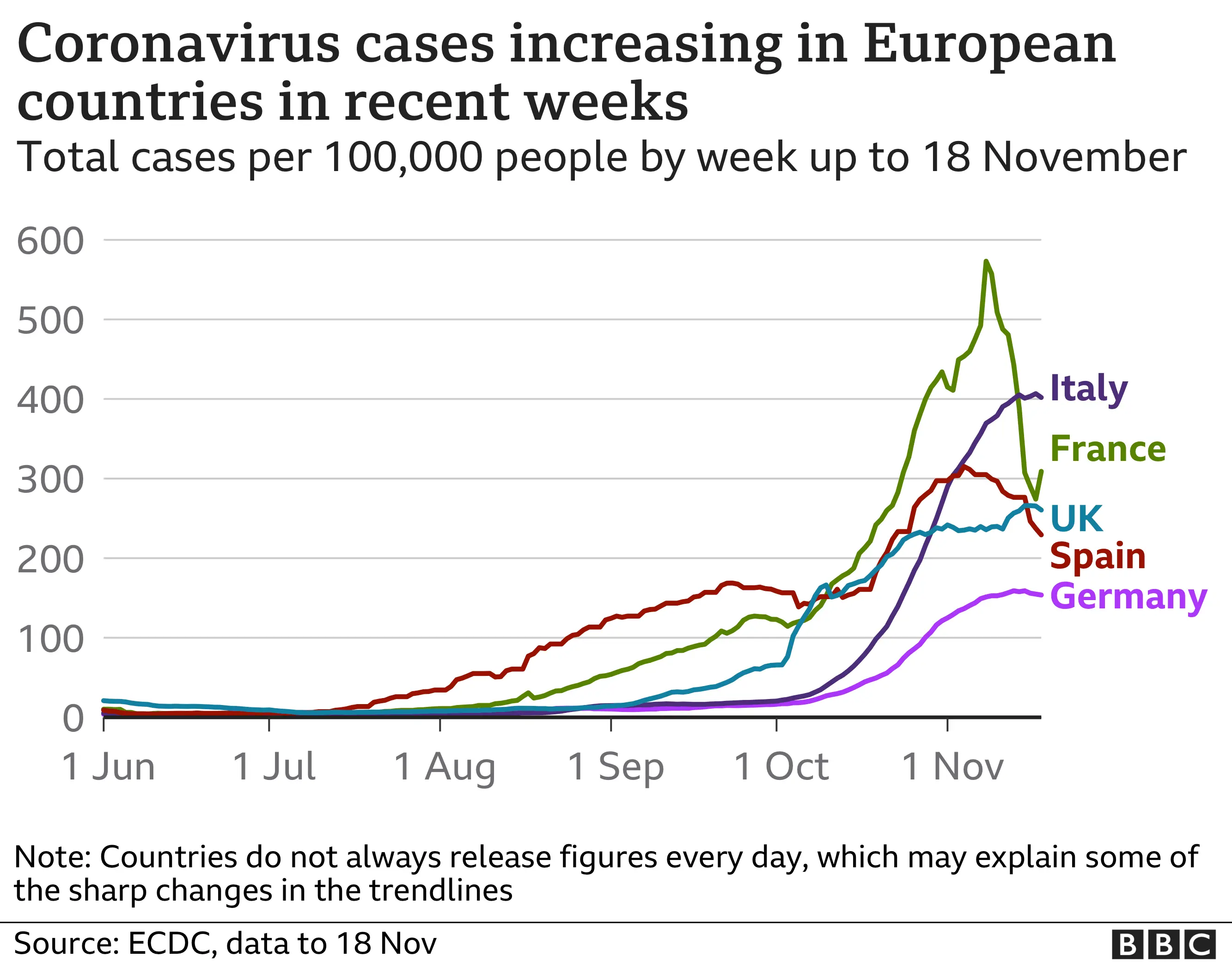Coronavirus: Europe faces 'six tough months' of pandemic, WHO says
A "tough" six months lies ahead for Europe, which is again the epicentre of the coronavirus pandemic, the World Health Organization (WHO) has warned.
Hans Kluge, WHO Europe director, said the continent had recorded more than 29,000 new Covid-19 deaths last week.
However, he said new cases were declining as lockdowns curb infections.
And at a virtual summit on Thursday, European Commission President Ursula von der Leyen said the bloc could approve two vaccines by year's end.
Most European countries reintroduced tight restrictions to stem the spread of the disease as a second wave of the pandemic gathered pace in October.
So far, Europe has seen 15,738,179 confirmed infections and 354,154 deaths attributed to the coronavirus, with only the Americas reporting higher region-wide figures, according to WHO data.
A large portion of those infections and deaths have been registered in the UK, Russia, France, Spain, Italy and Germany. In Europe, the UK has the highest death toll at 53,870, while France has the highest number of cases at 2,115,717.
What did Dr Kluge say?
He said Europe accounted for 28% of global cases and 26% of deaths.
He expressed particular concern over the situation in Switzerland and France, where intensive care units are at 95% capacity.
"Europe is once again the epicentre of the pandemic, together with the United States," Mr Kluge told a news conference in Copenhagen, Denmark, adding that latest figures showed there was "one person dying every 17 seconds".


"There is light at the end of the tunnel but it will be a tough six months," he said, referring to the development of vaccines.
The development of vaccines, which train the immune system to fight off the virus, have raised hopes of bringing the pandemic under control.
Four vaccines - Oxford, Pfizer-BioNTech, Sputnik and Moderna - have reported good preliminary data.
What happened at the EU summit?
EU leaders discussed the pandemic response at a virtual summit on Thursday.
Mrs von der Leyen said the European Medicines Agency could give "conditional marketing authorisation" for the Moderna and Pfizer-BioNTech vaccines "as early as the second half of December if all proceeds now without any problem".
"We will continue co-ordinating our efforts to keep citizens informed on vaccination," she added.
EU leaders have come up with a €1.8tn (£1.6tn) EU budget until 2027. including a €750bn coronavirus recovery fund. But Hungary and Poland have blocked approval of the budget, over a clause that ties funding with adherence to the rule of law in the bloc.
Meanwhile, researchers in the UK and the Netherlands have said that a drug to treat rheumatoid arthritis - tocilizumab - appears to treat people who are critically ill with Covid-19.
The findings are the results of early data from a trial focusing on the most severely ill patients - some experts have urged caution until the full data is released.

More on vaccines:

Mr Kluge said recent progress on vaccines was promising, but did not yet represent "a silver bullet" because "we know the supply will be limited particularly in the beginning".
In the meantime, social distancing and wearing a mask remained the best ways to mitigate the spread of the virus, he said.
"Lockdowns are avoidable, I stand by my position that lockdowns are a last resort measure," Mr Kluge said. "Mask use is by no means a panacea, and needs to be done in combination with other measures. However, if mask use reached 95%, lockdowns would not be needed."
What's happening in individual countries?
France is in its second national lockdown, with people only allowed to leave home to go to work or school, buy essential goods, seek medical help or exercise for one hour a day.
Anyone going outside must carry a written statement justifying their journey.
French Health Minister Olivier Veran said that while it was too soon to lift restrictions, the virus was not circulating as widely as before the latest measures were introduced.
He told a news conference that anxiety and uncertainty caused by the pandemic was affecting the mental health of the population but that "we must not reduce our efforts".
In Italy, where Covid-related deaths have already more than doubled in November compared with October, Prime Minister Giuseppe Conte warned that Christmas would look very different this year.
"Big parties, kisses and hugs will not be possible, this would mean an abrupt rise in the [infection] curve in January," he said, adding: "We hope that we can still buy and exchange gifts."
Scientists advising the UK government have raised similar concerns, warning that mixing between households at Christmas could pose "substantial risks", particularly for older people more vulnerable to coronavirus.
Another 22,915 daily cases of Covid were recorded in the UK on Thursday, and there were 501 further deaths within 28 days of a positive test, the government's dashboard shows.
Russia is also recording more than 20,000 new cases each day. Authorities in the capital Moscow have opened five field hospitals to help cope, including one in an ice rink.
